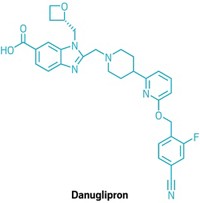Advertisement
Grab your lab coat. Let's get started
Welcome!
Welcome!
Create an account below to get 6 C&EN articles per month, receive newsletters and more - all free.
It seems this is your first time logging in online. Please enter the following information to continue.
As an ACS member you automatically get access to this site. All we need is few more details to create your reading experience.
Not you? Sign in with a different account.
Not you? Sign in with a different account.
ERROR 1
ERROR 1
ERROR 2
ERROR 2
ERROR 2
ERROR 2
ERROR 2
Password and Confirm password must match.
If you have an ACS member number, please enter it here so we can link this account to your membership. (optional)
ERROR 2
ACS values your privacy. By submitting your information, you are gaining access to C&EN and subscribing to our weekly newsletter. We use the information you provide to make your reading experience better, and we will never sell your data to third party members.
Pharmaceuticals
Scientists Accused Of Stealing GSK Trade Secrets
Intellectual Property: Two company researchers said to plan to sell antibody technology in China
by Michael McCoy
January 21, 2016

The U.S. has filed an indictment against five people, two of them GlaxoSmithKline scientists, involved in an alleged scheme to steal GSK biopharmaceutical trade secrets and sell them.
The scientists are Ph.D. biochemist Yu Xue and researcher Lucy Xi, both of whom worked at GSK’s R&D facility in Upper Merion, Pa.
The indictment says Xue e-mailed confidential information relating to a dozen or more products and numerous GSK processes from her GSK e-mail account to her personal account and then forwarded the information to Tao Li, a Ph.D. molecular biologist; Yan Mei, a Ph.D. medicinal chemist; and others. Xue also used her GSK computer to download trade secret information onto a portable storage device. Xi similarly e-mailed confidential information.
According to the indictment Xue, who worked for GSK from 2006 to 2016, Li, and Mei formed firms in the U.S. and China called Renopharma to market information related to the products, notably an anti-HER3 antibody that GSK was developing as a cancer therapy similar to Herceptin.
In an e-mail obtained by the FBI, Li told others that the partners’ plan was to build a Chinese company that offered antibody humanization/affinity maturation services and then later develop their own antibody drugs. “We have several developed and validated humanized antibodies targeting a certain important target, which is ready for animal experiments,” he wrote. “It’s a fast way to produce a ‘real’ drug in China.”
GSK says it is aware of the case and has been cooperating with U.S. authorities. “While we’re limited on what we can say about this ongoing investigation beyond the details in the indictment, we do not believe the breach has had any material impact on the company’s business or R&D activity,” the firm says.



Join the conversation
Contact the reporter
Submit a Letter to the Editor for publication
Engage with us on Twitter